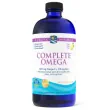Omega 3-6-9 for Heart Health: How These Fatty Acids Protect Your Cardiovascular System

Key Takeaways
Omega 3-6-9 fatty acids offer:- Cardiovascular Protection: Omega-3s reduce inflammation, lower triglycerides, and improve heart rhythms.
- Blood Pressure Regulation: Omega-6s promote healthy blood pressure and support blood vessel function.
- Cholesterol Balance: Omega-9s enhance cholesterol levels by increasing HDL and lowering LDL, reducing heart disease risk.
Article by Arnie Gitomer Dec 5, 2024
Heart health is a top concern for many of us, and with good reason. Cardiovascular diseases remain a leading cause of death globally. However, one of the most natural and effective ways to support heart health is through the intake of omega fatty acids—specifically, Omega 3, 6, and 9.
The benefits of omega 3-6-9 are significant, as these essential fatty acids play a crucial role in maintaining optimal cardiovascular function, reducing the risk of heart disease, and improving overall well-being. If you're looking for a convenient way to add these essential fatty acids to your routine, check out the Omega 3-6-9 Complete Lemon Supplement offered by Willner Chemists.
What Are Omega 3-6-9 Fatty Acids?
Omega-3, Omega-6, and Omega-9 are unsaturated fats, also known as "good fats." Each type has distinct health benefits but provides a powerful synergy supporting heart health and overall bodily functions.
- Omega-3 is a polyunsaturated fat that reduces inflammation and prevents heart disease. It’s found in fatty fish (salmon, mackerel, sardines), flaxseeds, and walnuts.
- Omega-6 is another polyunsaturated fat important for brain function and normal growth. It's present in vegetable oils such as sunflower and safflower oils.
- Omega-9 is a monounsaturated fat in olive oil, avocados, and nuts. While your body can produce omega-9, getting it from your diet enhances cardiovascular benefits.
The Impact of Omega 3-6-9 on Heart Health
The anti-inflammatory and cholesterol-lowering properties of omega-3, 6, and 9 fatty acids are essential when discussing heart health. Let’s take a closer look at how each of these fatty acids contributes to cardiovascular wellness:
Omega-3: The Heart Protector
Omega-3 fatty acids are perhaps the most studied of the group when it comes to heart health. Research shows that omega-3 helps reduce inflammation, lower triglycerides, and even decrease the likelihood of abnormal heart rhythms.
- Reduces Inflammation: Chronic inflammation is linked to several cardiovascular conditions, including atherosclerosis. Omega-3s, particularly EPA and DHA, help to suppress inflammation by reducing the production of inflammatory molecules.
- Lowers Cholesterol Levels: High triglycerides are a significant risk factor for heart disease. Regular consumption of omega-3s has been shown to lower triglyceride levels by 20-50%.
- Improves Heart Rhythms: Omega-3s prevent arrhythmias, or irregular heartbeats, which are associated with increased risk of sudden cardiac death.
You can easily add omega-3s to your diet by using a supplement like the Omega 3-6-9 Complete Lemon, which offers a convenient way to boost your intake.
Omega-6: Essential for Overall Cardiovascular Function
Omega-6 fatty acids also benefit heart health, though they can be more controversial. While necessary for many bodily functions, an imbalance with omega-3 can lead to pro-inflammatory effects. However, in the right balance, omega-6 is vital for the following:
- Regulates Blood Pressure: Linoleic acid, the most common omega-6 fatty acid, regulates blood pressure. By enhancing vascular function, omega-6 fatty acids promote healthier blood flow and reduce the risk of hypertension.
- Promotes Blood Vessel Health: Omega-6 helps maintain the structure and function of cell membranes in the heart and blood vessels, aiding in optimal cardiovascular function.
Omega-9: The Cholesterol Manager
Although Omega-9 is considered a non-essential fatty acid (because the body can produce it), including it in your diet has profound cardiovascular benefits. Omega-9 is known to:
- Improve Cholesterol Levels: Diets rich in omega-9 can increase levels of HDL cholesterol ("good cholesterol") while lowering LDL cholesterol ("bad cholesterol"). This balance is essential for reducing the risk of heart attacks and strokes.
- Reduce Inflammation: Like omega-3, omega-9 has anti-inflammatory properties. Including sources such as olive oil in your diet can help protect against chronic inflammation linked to cardiovascular diseases.
Best Dietary Sources of Omega 3-6-9
Incorporating omega-3, 6, and 9 into your diet can be simple and delicious. Here are some of the best natural food sources for each:
- Omega-3 Sources: Fatty fish (such as salmon, mackerel, and sardines), flaxseeds, chia seeds, walnuts, and algae-based supplements.
- Omega-6 Sources: Vegetable oils (such as sunflower, safflower, and corn), tofu, hemp seeds, and evening primrose oil.
- Omega-9 Sources: Olive oil, avocados, almonds, cashews, and macadamia nuts.
How to Balance Omega 3-6-9 in Your Diet
While omega-3 and omega-6 are essential fatty acids, many consume far more omega-6 than omega-3. This imbalance can increase the risk of inflammation and other health issues. Aim for a healthy ratio of omega-3 to omega-6, ideally around 1:2 to 1:4, to ensure you get the most cardiovascular benefit.
Here are a few tips on how to achieve the right balance:
- Increase Omega-3 Intake: Incorporate fatty fish into your diet at least twice a week. Flaxseeds, chia seeds, and algae-based omega-3 supplements are excellent alternatives for those following a plant-based diet.
- Limit Processed Foods: Many processed and fast foods contain high levels of omega-6 due to the use of vegetable oils. Opt for whole, unprocessed foods to keep your omega-6 intake in check.
- Use Olive Oil: To further enhance heart health benefits, swap out other cooking oils for olive oil, a rich source of omega-9.
Supplements: Do You Need Them?
Although it is possible to obtain omega 3-6-9 from a well-balanced diet, many people find it challenging to maintain the ideal ratio. In such cases, supplements can be a convenient solution. The benefits of omega 3-6-9 are numerous, and taking a supplement ensures you get the right balance of these essential fatty acids.
Look for high-quality omega 3-6-9 supplements that are balanced and free from harmful additives, like the Omega 3-6-9 Complete Lemon. Consult a healthcare provider before starting any supplement regimen to ensure it’s appropriate for your needs.
To Wrap It Up
Incorporating omega 3, 6, and 9 into your diet is a powerful step toward safeguarding your heart health. The benefits of omega 3-6-9 are extensive: these essential fatty acids reduce inflammation, balance cholesterol levels, and promote overall cardiovascular function.
Whether you get them through food or supplements, maintaining the right balance of omega 3-6-9 is a simple yet highly effective way to protect your heart and enhance your overall well-being. For those looking to boost their heart health, making these fatty acids a regular part of your diet could be one of the best decisions you make for long-term wellness.
 |
Read more about Arnie Gitomer |
Product Search Results

|
Omega 3 6 9 Complete Lemon | Nordic Naturals | Login for Price | 58344 |
